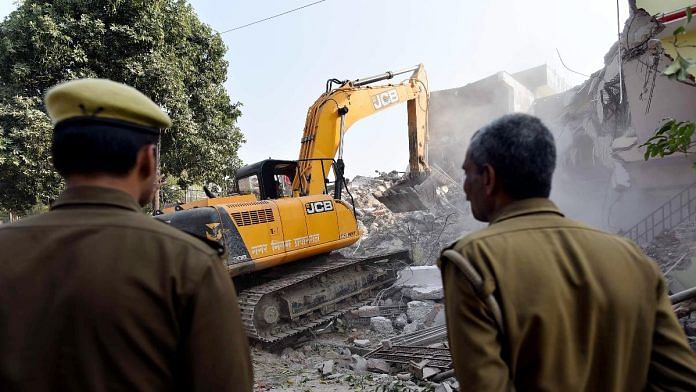After communal violence broke out in Nuh, Haryana, in July, the state government bulldozed many homes, shops and office complexes owned by Muslims. It prompted the Punjab and Haryana High Court to take suo motu cognisance of the matter and halt the demolition campaign. Crucially, the court asked whether the operation was an “exercise of ethnic cleansing” by the state.
On 31 July, violence ensued after a yatra organised by the Vishva Hindu Parishad (VHP) and Bajrang Dal. It killed six people, including two home guards. Haryana Home Minister Anil Vij called the clashes ‘pre-planned’ and informed the media about 202 arrests in the region. He said that the alleged culprits will get “bulldozer ilaaj (punishment).” And from 3 August, properties of Muslims in Nuh were being razed to the ground, citing illegal encroachment.
Destroying homes, economy
The timing of the demolition made the drive seem a lot more questionable. It happened when people of Nuh were already traumatised by the communal violence, wherein they were targeted for their Muslim identity. The bulldozer worsened their plight.
Struck without any warning or legal notice, women and children were left to pick up their life buried under the rubble. Home provides individuals with a sense of security, particularly to women. Surrounded by the four walls are their hopes and dreams for the future. When the government decides to implement ‘instant justice’ by destroying that very house, all those hopes shatter with it.
It is the responsibility of our government to attain the Sustainable Development Goals, keeping local community growth and economic progress at the centre. But the Haryana government’s bulldozer punishment undermines both the community and its economy.
The families uprooted in Nuh, already struggling for basic needs such as health and education, were pushed further backwards on social, political, and economic grounds. It’s obvious that the state’s action was a deliberate step towards the community’s exclusion.
The bulldozer action and arrests eventually ends up hurting the women most. Traditionally excluded from decision-making in patriarchal families, they find it a lot more challenging to take the next step. With all their energy invested in rebuilding their home and securing livelihood, the women have a hard time deciding whether they could take legal action against the state and expect justice. In all this, their and their children’s health, both physical and mental, suffers immensely.
They are punished for an act they did not commit. As a result, long-term trauma, lack of trust, and insecurity towards the government and society increases among these women.
“Demolition is an irreversible action, causing immediate and prolonged financial distress in addition to humiliation and emotional trauma,” Justice Madan B Lokur wrote in his article.
Bulldozer justice
Every time the government has taken bulldozer action against a community, it has accused them of illegal construction or encroachment. If the properties of Muslims in Nuh were unlawful, then why didn’t the state take legal action before the communal clashes took place in July?
According to multiple reports, the state government also demolished homes of people below the poverty line. Two of such families were living in a house built under the Indira Awas Yojana and that didn’t stop authorities from demolishing them. After violent clashes in April during a Ram Navami procession in Khargone, Madhya Pradesh, the district administration razed houses in a Muslim locality, which was built under the PM Awas Yojana.
What happens after the government destroys the homes of people? Will the government of Haryana rebuild properties in Nuh or rehabilitate the families? The administration led by the Bharatiya Janata Party (BJP) has not brought up the subject yet.
The intent behind the bulldozer politics seems to be centered around collective punishment, instilling a sense of fear and terror within marginalised communities.
The BJP government is using the riots in Haryana to justify destruction of Muslim homes. The state government is blindly implementing Uttar Pradesh CM Yogi Adityanath’s “bulldozer justice” to appease the Hindu majority.
Neglected victims
The victim families in Nuh alleged that they were not given any notification or warning before their houses were demolished. If the state is really punishing them for alleged encroachment or illegal construction, the accused persons should also be given a chance to present their story.
The concept of natural justice went out of the window in Haryana. A jurisprudence that prioritises “setting an example” and “teaching a lesson” over restorative justice is likely to push the logic of vendetta or retribution to its political breaking point.
Even if the residents of Nuh are proved guilty of unlawful construction, is demolishing their homes justifiable? By punishing the alleged culprits even before their crime is proved, the bulldozer is wrecking lives of innocent people, especially children who don’t even understand communal politics.
Bulldozer justice goes against the basic principles of law—1,000 culprits can escape, but one innocent person should not be punished.
Views are personal.
(Edited by Ratan Priya)



